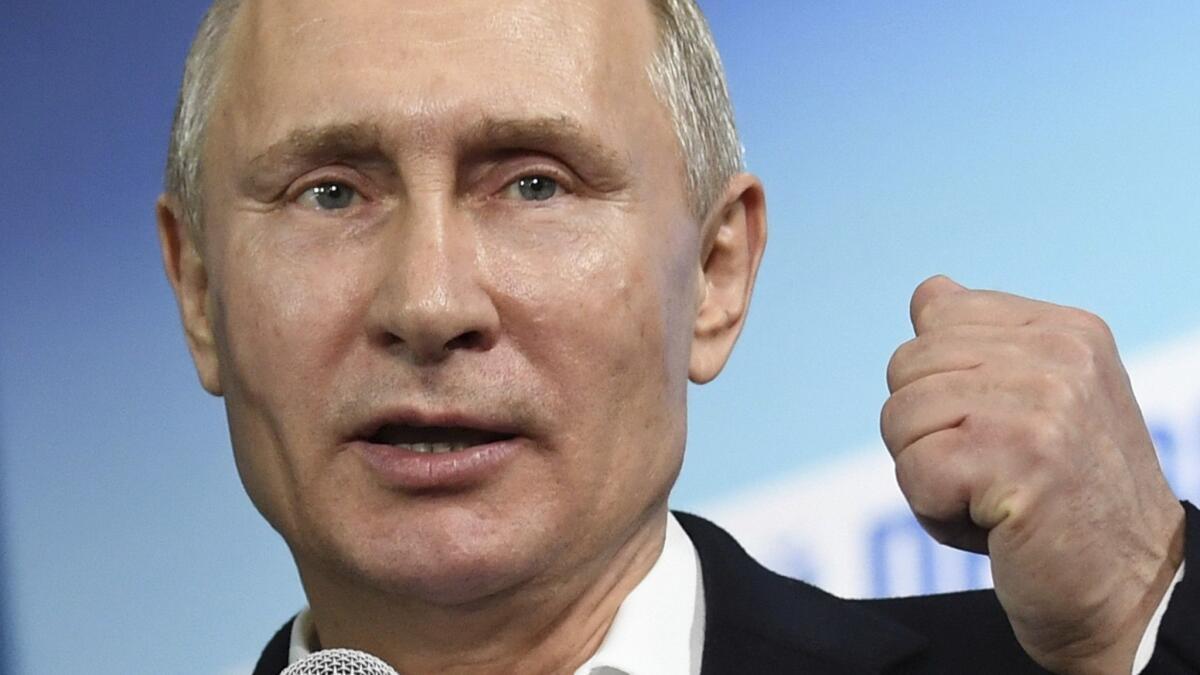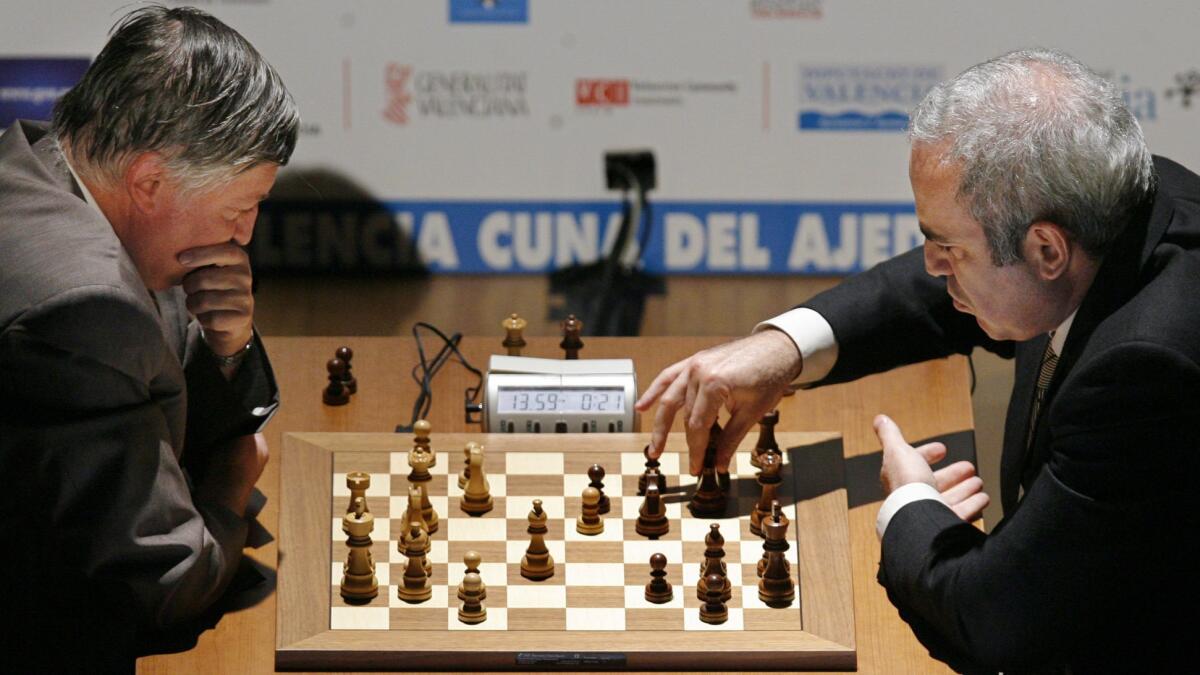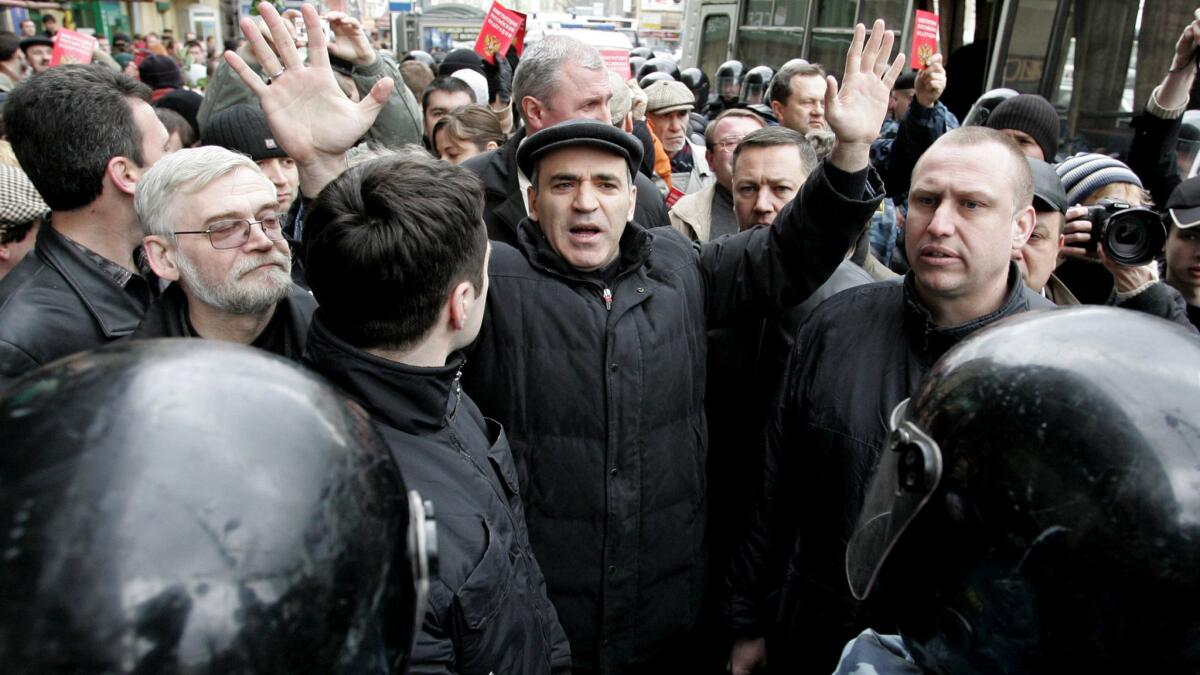Chess grandmaster Garry Kasparov warns of a Russia increasingly devoid of freedoms
- Share via
Until his retirement from the professional game in 2005, Garry Kasparov was widely considered to be the greatest chess player of all time. These days, the Russian grandmaster has moved from battling opponents at the checkered board to fighting for democracy and civil rights.
He is the chairman of the New York-based Human Rights Foundation, whose mission is “promoting freedom and human rights around the world and … supporting dissidents, no matter what cause they stand for, as long as it’s creative dissent,” he said.
Dominating its recent agenda is Russian President Vladimir Putin. Earlier this month, the foundation held PutinCon, a conference in New York dedicated to examining the Russian leader’s rise to power, his 18 years at the helm and his vision for the country’s future.
The gathering came two days before Putin was reelected to a fourth term as president and at a time when Moscow faces drastically deteriorating relations with the West, including U.S. financial sanctions and diplomatic expulsions from Britain following accusations that Putin sanctioned the poisoning of a former Russian spy living in England.
Kasparov, who in 2007 launched — but was forced to quit — a presidential campaign and fled the country six years later for fears of political persecution, spoke to The Times about Russia in the age of Putin.
The interview has been edited for length and clarity.
How do you characterize human rights in Russia today?
Russia is a personal dictatorship that openly embraces many elements of fascist ideology and also attacks its neighbors. Human rights in Russia do exist, but only within the territory that the Kremlin allows it for its own political purposes.
No one is safe in Russia. If you oppose the government, they may decide that for a while you could be sort of left alone. But you could go to jail, or … you could be killed.
By the way, even reprinting [material considered critical of the state] is now one of the unofficial crimes in Russia, because they always find a way to describe it as an attempt to disturb social peace. Dictatorships are very creative in finding new quasi-legal definitions that they use against people who may show either dissent, or in some cases not celebrating the dictatorship as vigorously as they’re supposed to.

So are you expecting human rights to deteriorate further with the reelection of Putin?
The situation will deteriorate because … we have a dictator that made it very clear that he would not go anywhere voluntarily. This dictatorship will not end by the ballot. They totally control everything and the grip on power in Russia has reached a point where you can hardly expect any social uprising that can lead to the demise of the regime, unless the regime is being weakened by geopolitical defeat.
How do you respond to supporters of Putin who say that Russia doesn’t want a democracy like the West, that Russians want and need control by the proverbial “iron fist”?
It’s absolute nonsense. First of all, I don’t want anybody to speak on behalf of Russians. What I want is just for people of my country to be able — as in America or Europe — to express their views freely, without fear of being punished for their dissent. And then we’ll see what happens.
And if Putin is so popular … why are his critics and potential opponents either being jailed or pushed into exile or killed?
People are saying, “Oh, he’s very popular.” How do you evaluate popularity in a dictatorship? If you have one restaurant in town selling food and all the other restaurants are burned to the ground, is this [sole] restaurant popular?
Also, polling in this country and elsewhere in the world means that someone calls you — a stranger — and asks your opinion. Now, what do you expect [of] Russian people, many of whom were born in the Soviet Union? They still know what the KGB is. They know that a KGB lieutenant colonel is in power now. Do you expect them to be frank telling the stranger on the phone what they think about Putin?
We can see clearly that people given the opportunity to live in the free world always perform better, because at the end of the day progress is based very much on our ability to challenge the status quo, our ability to go against authority, our ability to accept failure as a part of our road to success.
The central planning economy, the communist dictatorships, they cannot accept failure because it contradicts the notion of … supreme power.
What kind of lessons and strategy from being a chess grandmaster could be transferred to your human rights work?
I could start reading a long lecture about the lessons from the game of chess that can help you make decisions, strategize, be creative, read the opponent’s mind. The problem is … that in Putin’s Russia it didn’t help me at all, because in chess we have fixed rules and unpredictable results. In Putin’s Russia it’s exactly the opposite. The result always stays the same, while the rules are what the Kremlin thinks today is the most convenient to attain their goals.

You were once a beloved chess champion. Everyone knew you. How do you feel Russians view you today?
There are a lot who are either on the [Kremlin’s] payroll or some who have crazy ideas that Russia should be in confrontation with the West, and many of them believe that I am a bad guy. But I still believe I have a massive following, and if you want free and fair elections, I would be very happy to debate Mr. Putin, or whoever he appoints, on Russian television. The problem is that Putin has never participated in a single debate in his life.
How do you envision Russia post-Putin?
The collapse of the Putin regime — which I believe is inevitable — doesn’t automatically mean that the next day you have representative democracy.
I always warn people not to expect immediate changes because it’s not about just building democracy on the rubble of dictatorship. It’s about giving people a chance. Unfortunately they can very often miss [this chance]. They can blow it up.
I can guarantee you that as long as Putin stays in power nothing will happen. There will be no positive changes, and moreover we could see that this paranoid dictator is getting more and more concerned about his own physical safety. Unlike dictators of the past, he has his finger on the nuclear button. And in the last few months you could hear him contemplating nuclear conflicts. He’s reaching a point where he doesn’t see the world without him being in power. And that’s very dangerous. That’s why every year he stays in power, every month, even every day, puts us in more danger.
The only way for the free world to confront this very dangerous development is to make sure that some of his close associates will be forced to choose between their personal interests and their fortunes kept outside of Russia, and deciding if they want to follow Putin’s criminal orders.
So the only way for us to see the split between Putin and the Russian elite is if the free world actually demonstrates political will to fight for our values and to make sure that any attack on our interests — on American elections, on European elections, God forbid on America’s electrical grid — will be met with an overwhelming response.
You’re very passionate and outspoken against Putin. Do you fear for your safety?
Would it help? People kept asking me when I left Russia, why I chose New York and not London. They’re not asking anymore.

For more on global development news, see our Global Development Watch page, and follow me @AMSimmons1 on Twitter
More to Read
Sign up for Essential California
The most important California stories and recommendations in your inbox every morning.
You may occasionally receive promotional content from the Los Angeles Times.











